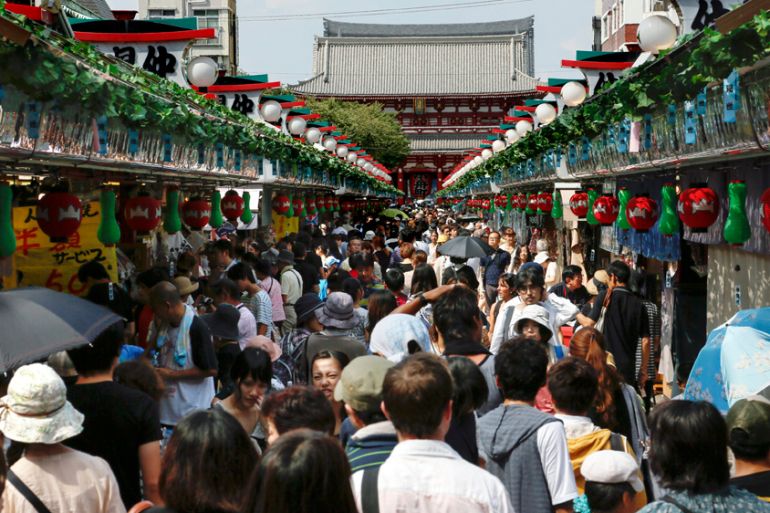Japan embraces Muslim visitors to bolster tourism
Japanese entrepreneurs see lucrative opportunities in attracting Muslim tourists.

Tokyo, Japan – While the United States debates the feasibility of closing its doors completely to Muslim immigrants and visitors, Japan has quietly been adopting the opposite approach and rolling out the welcome mat for Muslims. It sees Muslim tourists as an opportunity to boost its economy.
This blossoming of Japanese hospitality towards Muslims stands in direct contradiction to widely circulated internet rumours among US conservatives claiming that Muslims are not even allowed to enter Japan.
Keep reading
list of 4 itemsPhotos: Ukraine marks its third Easter at war
Israeli police detain Greek consul’s guard at Orthodox Easter ceremony
Gunman kills at least six in attack on mosque in Afghanistan’s Herat
Tourism is one area where the “Abenomics” policies of Prime Minister Shinzo Abe have undeniably found the success that has so far eluded much of the rest of the programme.
|
|
| Watch: Japan politics and media |
When Shinzo Abe and his Liberal Democratic Party returned to power in December 2012, the value of the Japanese Yen was at about 85 to the US dollar.
His government’s push for monetary easing devalued the Yen sharply, so that it now stands at about 120 Yen to the US dollar. One result of this is that it has now become much more affordable for overseas tourists to visit Japan.
The Abe government had initially set a target of attracting 20 million tourists each year by 2020.
But the acceleration in numbers has far outstripped expectations, meaning that the 20 million figure may be met this year – five years ahead of schedule. Now the government has revised its target upwards to 30 million tourists by 2020.
Muslim hospitality handbook
Muslim tourism, led by Malaysians and Indonesians, is a major part of this wave.
According to the figures compiled by the Japan National Tourism Organization, by the end of October 2015 the number of Malaysian inbound tourists had risen by 18.2 percent over last year’s figures. The one-year jump in the numbers of Indonesians visiting Japan was even more dramatic at 30.8 percent.
When the total numbers are calculated, it appears that something like 270,000 Malaysian and just under 200,000 Indonesians will have visited Japan this year. Naturally, smaller numbers of Muslim tourists are visiting from other nations as well.
Japanese local governments and businesses have been responding proactively to this new set of customers arriving on their shores.
![Tourist brochure from Aichi [Aichi tourism bureau]](/wp-content/uploads/2015/12/8736c69b9634441f9a02b2ac3124c44c_6.jpeg)
For example, Aichi Prefecture in central Japan recently published a Japanese-language Muslim Hospitality Handbook to teach the Japanese how they should behave when Muslim customers enter their shops.
With its cartoon illustrations, this handbook covers a lot of ground in its 15 pages – outlining basic Muslim beliefs and global demographics, common difficulties that Muslims face when visiting Japan, the facilities that Muslims need in order to pray, the locations of the local mosques, the food Muslims can eat, and wi-fi services that Muslims visiting Japan might find helpful.
Muslims searching for halal restaurants can now find online lists, and Japanese businesses have been moving to enter the halal food market with an eye towards expanding agricultural exports.
Catering to the tourists
Some Japanese travel agencies now offer special programmes aimed specifically at Muslim travellers.
For instance, a small start-up called Travelience now offers a one-day Tokyo Tour for Muslim Tourists.
The company’s chief executive, Naoaki Hashimoto, explained to Al Jazeera how the creation of the package was led by customer demand.
Originally Hashimoto’s company offered only a standard lunch tour, but he and his staff quickly observed that the Muslims who joined the tour wouldn’t eat any of the food served to them. Japanese staff felt sorry watching their Muslim customers go hungry, so Hashimoto began to investigate what kind of food he could serve to his Muslims.
Together with other local business owners, he organised study meetings to learn about halal food and where it could be found in Tokyo.
Based on this, Hashimoto designed his special tour package for Muslims, which includes the standard tourist venues, such as the Tsukiji fish market, the Hamarikyu gardens, and the trendy shopping districts of Harajuku and Shibuya, but also lunch at a halal restaurant and mosque visits for midday and early afternoon prayers.
RELATED: Japan’s newest mosque
Hashimoto reports that his Muslim customers are overwhelmingly from Malaysia and Indonesia, but that he has also had some from further afield, such as Saudi Arabia.
Finding halal food
Japan is making rapid strides in developing its approach to Muslim tourism, but based on interviews with ordinary Muslims at popular sites such as Tokyo Asakusa, there is still room for progress.
Hafiz Rivky, a young Malaysian travelling with two friends, spoke of difficulties communicating with the Japanese, finding places for prayer, and obtaining halal food.
READ MORE about Islam in Japan – past and present
He said that he was mostly surviving on onigiri with seaweed which he was buying from convenience stores.
On the other hand, other Muslims who did some online research before their visit said they had few difficulties in finding halal food and that all the necessary facilities for Muslims exist in Tokyo as long as you know where to look for them.
The Japanese are as exposed to negative portrayals of Muslims as any other nationality, but unlike in much of the rest of the world, they are opening their arms to Muslim tourists.
Follow Michael Penn on Twitter: @ShingetsuNews